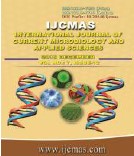


 National Academy of Agricultural Sciences (NAAS)
National Academy of Agricultural Sciences (NAAS)

|
PRINT ISSN : 2319-7692
Online ISSN : 2319-7706 Issues : 12 per year Publisher : Excellent Publishers Email : editorijcmas@gmail.com / submit@ijcmas.com Editor-in-chief: Dr.M.Prakash Index Copernicus ICV 2018: 95.39 NAAS RATING 2020: 5.38 |
One hundred twenty five advanced lines (F6) with four check varieties were evaluated in an augmented randomized complete block design for 13 different morphological traits under irrigated (E1) and water stressed (E2) conditions with five blocks during rabi 2015-16. Heritability was high (>50%) for all these characters except for test weight and oil content under E1 condition and for fruit zone length and oil content under E2 condition. The overall mean performance of progenies was comparatively higher in irrigated environment for plant height (PH), primary branches (PB), secondary branches (SB), fruiting zone length (FZL), main shoot length (MSL), siliquae on main shoot (SMS), siliquae per plant (SP), siliquae length (SL), seeds per siliquae (SPS), biological yield (BY) and seed yield per plant (SY). Seed yield per plant had positively and significantly correlated with PH (0.222), PB (0.641), SB (0.756), FZL (0.472), MSL (0.374), SMS (0.269), SP (0.722), SL (0.216) and BY 0.872) under irrigated condition while under rainfed condition seed yield per plant had positively and significantly correlated with all characters studied except oil content. On the basis of correlation study, it is suggested that PH, PB, SB, FZL, MSL, SMS, SP, SL and BY should be considered in selection programme for yield improvement in the segregating material generated by using selected advance lines. The values of DSI ranged from -1.544 (DRMR-1616-68-30-61) to 1.710 (DRMR-1722-45). The genotypes DRMR-1721-24, DRMR-1616-68-30-61 and DRMR-1676-71-32 had lower DSI values thus rated as drought tolerant.
 |
 |
 |
 |
 |